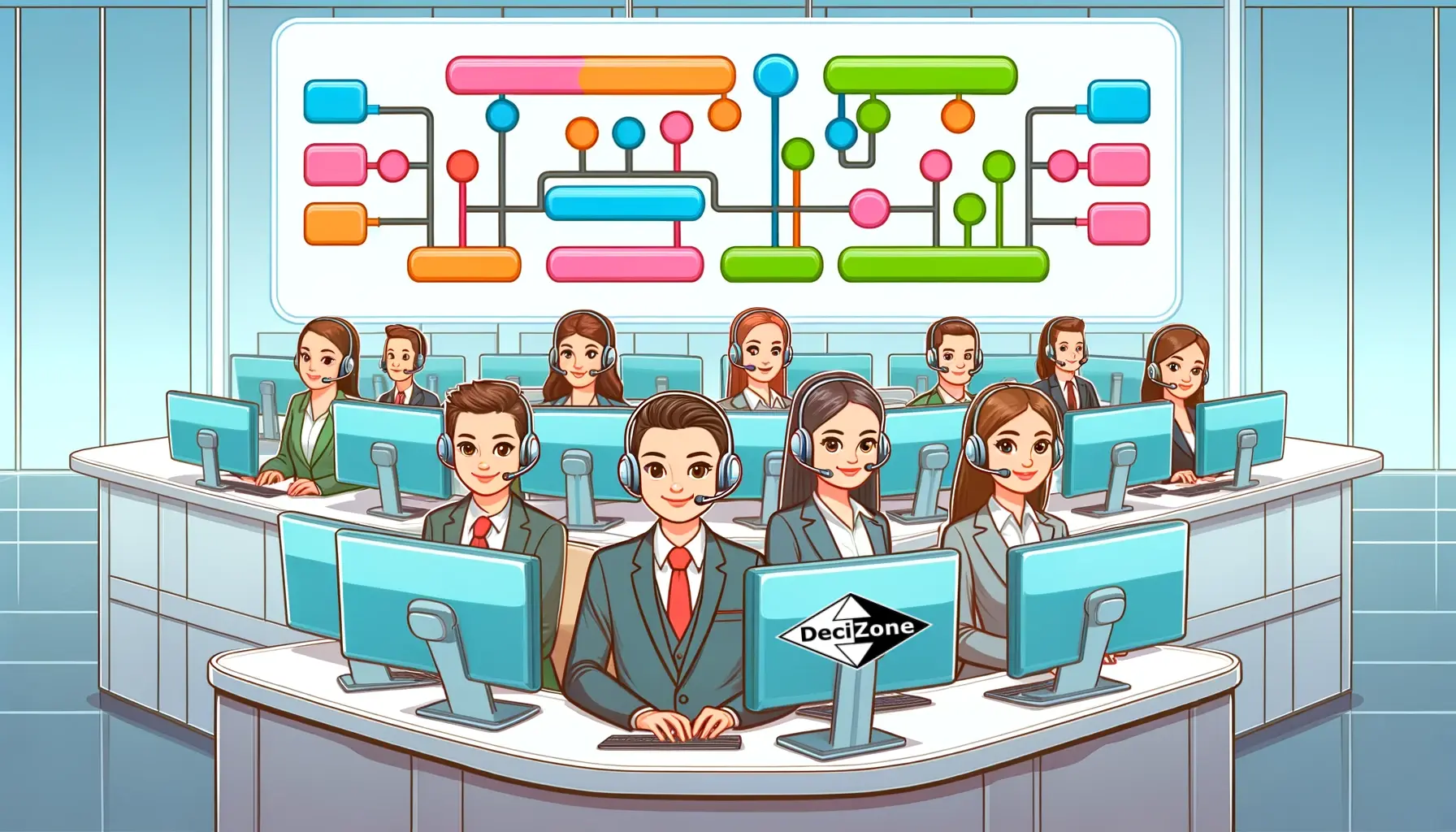AI Powered Human Judgement Beats Generative AI |Strategy| DeciZone

Executive Summary
This article argues that AI-powered human judgment is the superior and strategic approach for consistent customer support excellence, effectively beating sole reliance on Generative AI. It is written for customer support, customer experience, and operations leaders who need to deliver reliable, high-quality service while avoiding the inherent risks of pure AI, such as hallucination and bias. The expected outcomes include establishing consistent, empathetic, and personalized customer experiences, leading to increased trust, deeper customer loyalty, reduced churn, and a significant competitive edge.
Key Takeaways
- Generative AI is Insufficient:Relying solely on Generative AI creates risks of hallucination, bias, and misinformation due to its inherent lack of genuine human understanding and emotional intuition.
- Empathy is Critical:The customer is always human, meaning support requires a human co-pilot to inject empathy and creative problem-solving, which algorithms cannot replicate.
- Decision Trees Provide Consistency:Interactive decision trees are a key mechanism, incorporating human expertise and real-world insights to structure consistent, accurate guidance for self-service and human agents.
- Human Oversight is Non-Negotiable:Human wisdom and oversight are essential for ethical and responsible AI use, ensuring consistency, transparency, explainability, and accountability.
- Empathy Drives Profit:Measuring the "Return on Empathy" with metrics like CSAT and NPS is vital, as satisfied and loyal customers significantly outperform those served by inconsistent support.
"Alongside the benefits, AI will also bring dangers, like powerful autonomous weapons, or new ways for the few to oppress the many." - Stephen Hawking1
Generative AI - Hallucination, Bias and Misinformation. Can AI truly understand?

Generative AI, despite its profound capabilities, often stumbles upon the nuances of human interaction. The challenges are multifaceted - hallucination, where AI conjures up inaccurate data; bias stemming from the data it was trained on; and misinformation that can lead to customer dissatisfaction.
Can AI truly understand the depth of human emotions and provide solutions that resonate on a personal level? Generative AI systems, while efficient, lack the intuitive grasp of human emotions, often leading to responses that feel mechanical or out of context.
Hallucination: Generative AI can produce content or data that is not based on reality or facts, but rather on its own assumptions or interpretations. This can lead to inaccurate, misleading, or irrelevant information that can confuse or frustrate customers. For example, generative AI can generate text that is grammatically correct, but semantically nonsensical or contradictory.
"While AI is transformative, it requires the tempering of human wisdom to truly meet human needs," - DeciZone
Bias: Generative AI can inherit or amplify the biases of the data it is trained on, resulting in unfair or discriminatory outcomes. For example, generative AI can generate text that reflects the stereotypes, prejudices, or preferences of the data source, rather than the actual needs or expectations of the customers.
Misinformation: Generative AI can create or spread false or misleading information that can harm the reputation or credibility of your business. For example, generative AI can generate text that contains false claims, incorrect facts, or malicious intent, that can damage your brand image or trustworthiness.
These challenges and risks show that generative AI is not enough for customer support, as it cannot truly understand the context, intent, or emotions of the customers. Generative AI can only mimic or imitate human language, but not human judgement. Therefore, relying solely on generative AI can compromise the quality and consistency of your customer support.
54% [of surveyed people] believe they can tell the difference between content written by a human and that generated by automated chatbots.2
The Customer is Always Human - Why AI Needs a Human Co-pilot

At its core, customer support is about understanding and empathy - traits inherently human. The customer is always human, and humans crave empathy and understanding. AI can process and analyze data at unprecedented speeds. Humans, on the other hand, possess the invaluable ability to understand emotions, interpret nuances, and adapt their approach to each unique customer interaction. We can empathize with frustration, navigate complex situations, and offer creative solutions that go beyond scripted responses. It's the human agent who can truly empathize with customer frustrations and provide the comfort of being understood.
"AI powered human judgement is the combination of artificial intelligence and human judgement, where AI provides data-driven insights and recommendations, and human judgement provides context, intuition, and empathy." - DeciZone
AI powered human judgement is the combination of artificial intelligence and human judgement, where AI provides data-driven insights and recommendations, and human judgement provides context, intuition, and empathy. Integrating human judgment with AI leads to a more empathetic, understanding, and ultimately satisfying customer experience.
Enhance accuracy and relevance: AI powered human judgement can help you provide accurate and relevant information to your customers, by filtering out the noise, errors, or biases of generative AI. AI powered human judgement can help you verify, validate, and refine the information generated by AI, and ensure that it matches the customer’s needs and expectations - before it is delivered to the customer.
Improve personalization and engagement: AI powered human judgement can help you provide personalized and engaging support experiences to your customers, by adding a human touch, tone, and emotion to the AI-generated content. AI powered human judgement can help you customize, adapt, and optimize the content generated by AI, and ensure that it resonates with the customer’s personality and preferences.
Increase trust and loyalty: AI powered human judgement can help you increase trust and loyalty among your customers, by demonstrating empathy, understanding, and care. AI powered human judgement can help you connect, communicate, and collaborate with your customers, and ensure that they feel valued and appreciated.
76% of consumers are concerned with misinformation from artificial intelligence (AI) tools3
These benefits show that AI powered human judgement is better than generative AI for customer support, as it can provide more human-centric and customer-oriented support experiences. AI powered human judgement can help you deliver fast, accurate, and personalized support, while also building trust, loyalty, and satisfaction among your customers.
Decision Trees - Mapping the real experience, preferences and customer insights to make AI give consistent guidance

Decision trees are a powerful tool that can help you leverage AI powered human judgement to streamline your operations and enhance customer support excellence. Decision trees are graphical representations of a decision-making process, where each node represents a question, instruction or a choice, and each branch represents an outcome or a consequence.
Bridging the gap between AI efficiency and human judgment are 'interactive' decision trees. Interactive decision trees represent a significant leap in making AI customer support more reliable and consistent. These dynamic flowcharts guide customers through self-service portals, mimicking the thought process of a human agent. By incorporating real-world customer data, preferences, and insights gleaned from human agents, decision trees can provide consistent, accurate guidance, deflecting issues to self-service channels and freeing up agents for complex cases. Interactive decision trees help in creating a structured path for customer inquiries, leading to quicker and more effective resolution.
"Decision trees are the backbone of a customer-centric AI strategy, ensuring consistent and personalized support,"
Simplify complex processes: Decision trees can help you simplify complex processes, by breaking them down into simple, actionable steps. Decision trees can help you guide your customers through complex tasks, such as troubleshooting, product selection, or account management, and provide them with clear and concise instructions or recommendations.
Automate manual tasks: Decision trees can help you automate manual tasks, by providing automated responses or solutions. Decision trees can help you deflect tickets to self-service, by enabling your customers to find answers to their questions independently, without the need for agent intervention. Advanced solutions like DeciZone provide automated escalation in form of creating new ticket in your CRM when the interactive decision tree cannot resolve a customer's issue. This can reduce your support workload and costs, and improve your efficiency and scalability.
Optimize decision-making processes: Decision trees can help you optimize decision-making processes, by providing data-driven insights and recommendations. Decision trees can help you align your decisions with your strategies, goals, and values, and ensure consistency and accuracy in your support delivery. This can improve your performance and productivity, and drive your success and profitability.
[AI-powered decision making]... resulted in a 200% to 300% of self-service channel use, a 40% to 50% reduction in service interactions, and a more than 20% reduction in cost-to-serve. Incidence ratios on assisted channels fell by 20-30%, improving both the customer and employee experience.4
The Return on Empathy in Customer Support - Why Empathy And Creative Problem Solving Still Wins Hearts - Customers Crave Empathy and Understanding

Empathy isn't just good ethics; it's good business. Empathy is the ability to understand and share the feelings of another person. Empathy is a crucial skill for customer support, as it can help you build rapport, trust, and loyalty with your customers.
"Empathy is the invisible currency of customer loyalty,"
“Empathy is the key to customer support excellence."
"Empathy can help you connect with your customers, and make them feel heard, understood, and respected.”
In a world saturated with automation, customers crave genuine human connection and validation of their concerns. Understanding and addressing customer emotions can lead to deeper loyalty and increased brand advocacy. It can potentially transform support from a cost center into a loyalty builder. By empowering agents with AI-powered human judgment, organizations can foster an environment of empathy and creative problem-solving, leading to happier customers, reduced churn, and increased loyalty.
Understand customer needs and expectations: Empathy can help you understand the customer’s needs and expectations, by listening actively, asking relevant questions, and acknowledging their emotions. Empathy can help you identify the root cause of the customer’s issue, and provide them with the best possible solution.
Provide personalized and engaging support experiences: Empathy can help you provide personalized and engaging support experiences, by using a friendly and empathetic tone, and expressing genuine interest and care. Empathy can help you customize your support approach, and tailor your communication and content to the customer’s personality and preferences.
Increase customer satisfaction and loyalty: Empathy can help you increase customer satisfaction and loyalty, by exceeding their expectations, and making them feel valued and appreciated. Empathy can help you create positive and memorable support experiences, and inspire your customers to recommend your brand to others.
US auto insurance carriers that have provided customers with consistently best-in-class experiences have generated two to four times more growth in new business and about 30 percent higher profitability than firms with an inconsistent customer focus, in part because satisfied customers are 80 percent more likely to renew their policies5
Taming the AI Beast - Incorporating Human Wisdom & Oversight for Ethical and Responsible Support (Empathy, Intuition & Judgement beats algorithms every time)

While AI brings efficiency and speed, integrating human wisdom ensures ethical and responsible customer support. Human oversight in AI-driven systems acts as a check against the cold logic of algorithms, ensuring support is not just quick but also morally sound and intuitively aligned with customer values.AI can pose challenges and risks, such as:
Lack of transparency and explainability: AI can be a black box, where the logic and reasoning behind its decisions and actions are not clear or understandable. This can lead to confusion, mistrust, or dissatisfaction among customers, who may not know why or how AI is providing certain information or solutions.
Lack of accountability and responsibility: AI can be a scapegoat, where the blame and liability for its errors or failures are not clearly defined or assigned. This can lead to legal, regulatory, or reputational issues, where customers may not know who to hold accountable or responsible for AI’s mistakes or harms.
Lack of empathy and human touch: AI can be a cold and impersonal machine, where the emotional and social aspects of customer support are neglected or ignored. This can lead to poor customer experiences, where customers may not feel valued, appreciated, or cared for.
"Incorporating human wisdom ensures that AI systems serve us, not the other way around,"
AI, like any powerful tool, requires responsible stewardship. By incorporating human wisdom and oversight into AI-powered customer support systems, organizations can ensure ethical and responsible practices. This includes avoiding biased data sets, implementing explainable AI powered interactive decision trees from DeciZone, and fostering a culture of human-AI collaboration.
Ensure transparency and explainability: Human wisdom and oversight can help you ensure transparency and explainability, by providing clear and concise explanations or justifications for AI’s decisions and actions. Human wisdom and oversight can help you communicate the logic and reasoning behind AI’s information or solutions, and ensure that customers understand and trust AI’s output. Solutoins like DeciZone interactive decision trees allow egents to quickly guide customers and at the same time ensure that each recommendation was backed by your stategy, policy and best practices..
Ensure accountability and responsibility: Human wisdom and oversight can help you ensure accountability and responsibility, by establishing and enforcing clear and consistent rules and standards for AI’s behavior and performance. Human wisdom and oversight can help you monitor and evaluate AI’s actions and outcomes, and ensure that customers have recourse. Solutoins like DeciZone capture a detailed transcript of agents logical steps during a customer interaction to enable a responsible review later.
Ensure empathy and human touch: Human wisdom and oversight can help you ensure empathy and human touch, by adding a human element and emotion to AI-powered customer support. Human wisdom and oversight can help you personalize and customize AI’s content and tone, and ensure that customers feel valued, appreciated, and cared for.
Human wisdom and oversight are essential for ethical and responsible AI-powered customer support. Human wisdom and oversight can help you tame the AI beast, and ensure that AI serves your customers, not the other way around.
Earning Customer Trust - Let your Brand Advocates (customer support team) make Genuine Human Connection with your loyal customers

Trust is the cornerstone of any lasting customer relationship. Customer trust is a key factor that influences customer loyalty and retention. Customers trust businesses that provide reliable, consistent, and honest support experiences. However, trust is not easy to earn or maintain, especially in the age of AI. By trusting your customer support team with the power of AI-powered interactive decision trees, you empower them to become true brand advocates. Equipped with the right tools and training, your agents can build genuine human connections with your customers, fostering trust and loyalty.
"Loyal customers tell ten people; angry customers tell a hundred."
"Trust is built one interaction at a time, and each one counts,"
Your brand advocates are your most valuable asset, as they can:
Demonstrate your brand values and personality: Your brand advocates can demonstrate your brand values and personality, by communicating and behaving in a way that reflects your brand identity and culture. Your brand advocates can help you convey your brand message, vision, and mission, and ensure that customers align with your brand values and personality. Interactive decision trees can ensure conversations stay aligned with approved best practices.
Build rapport and emotional connection: Your agents can build rapport and emotional connection, by engaging and interacting with customers in a friendly and empathetic manner while making them feel heard, understood, and respected.
Provide feedback and insights: Byy collecting and analyzing customer data and feedback, your brand advocates can help you understand your customer needs, expectations, and preferences, and provide you with valuable insights to improve your products, services, and support.
Emotional factors comprise up to 70% of economic decision-making.
Companies that apply the principles of behavioral economics effectively can outperform their peers by 85% in sales growth and more than 25% in gross margin.6
Metrics that Matter - Measuring the Impact of Human Judgment on Consistent Customer Delight (Data empowers, intuition drives)

While data-driven insights from AI can inform strategic decision-making, it's crucial to measure the impact of human judgment on customer satisfaction. In the world of customer support, the right metrics can illuminate the path to continuous improvement. Measuring the impact of human judgement on customer support is essential to ensure the effectiveness and efficiency of your support operations. By tracking and analyzing relevant metrics, you can gauge the performance and productivity of your support team, and identify areas for improvement and optimization. Not all metrics are created equal. Some metrics are more important and relevant than others, depending on your business goals and objectives.
"You can't improve what you can't measure." - Peter Drucker
Customer Satisfaction (CSAT) Score: CSAT score measures the degree to which customers are satisfied with the support they received. CSAT score is calculated by asking customers to rate their support experience on a scale of 1 to 5, where 5 is the highest. A high CSAT score indicates that customers are delighted with the support they received, and a low CSAT score indicates that customers are dissatisfied with the support they received.
Net Promoter Score (NPS): NPS measures the likelihood that customers will recommend your brand to others. NPS is calculated by asking customers to rate their likelihood of recommending your brand on a scale of 0 to 10, where 10 is the highest. Customers who rate 9 or 10 are considered promoters, customers who rate 7 or 8 are considered passives, and customers who rate 6 or lower are considered detractors. NPS is calculated by subtracting the percentage of detractors from the percentage of promoters. A high NPS indicates that customers are delighted with your brand and willing to advocate for it, and a low NPS indicates that customers are unhappy with your brand and likely to switch to competitors.
Customer Effort Score (CES): CES measures the ease or difficulty of resolving an issue with your support. CES is calculated by asking customers to rate the effort required to resolve their issue on a scale of 1 to 5, where 1 is the lowest and 5 is the highest. A low CES indicates that customers are delighted with the ease and convenience of resolving their issue, and a high CES indicates that customers are frustrated with the effort and hassle of resolving their issue.
By monitoring and improving these metrics, you can measure the impact of human judgement on customer delight, and ensure that you provide consistent, quality, and satisfying support experiences to your customers.
[By implementing] successful experience-led growth strategies—those that increase customer satisfaction by at least 20%—can deliver a range of significant financial benefits. In particular, they can increase cross-sell rates by 15-25%, boost companies’ share of wallet by 5-10%, increase cross-sell rates, and improve customer satisfaction and engagement by 20-30%.7
Why Your Customer Support Needs a Human Touch & How to Get Started with AI Powered Human Judgement Today

Customer support is no longer a cost center; it's a strategic differentiator. By embracing AI-powered human judgment, you can deliver consistent, empathetic, and personalized customer experiences that build trust, drive loyalty, and ultimately, fuel business growth. Integrating human judgment with AI isn't just an upgrade; it's a revolution in customer support. Understanding the 'how' can set your organization on the path to delivering empathetic, efficient, and effective customer care. So, how can you get started with AI powered human judgement today? Here are some steps to guide you:
"The fusion of AI and human judgment is not the future; it's the present,"
Identify your customer support goals and challenges: Start by identifying your customer support goals and challenges, and determine where AI powered human judgement can add value with minimal effort. Focus on the areas where AI can provide data-driven insights and recommendations, and human judgement can provide context, intuition, and empathy. AI powered interactive decision trees by DeciZone can be an easy and quick way to get started. Sign up for a free trial today.
Choose a reliable AI powered human judgement solution: Choose a reliable AI powered human judgement solution that aligns with your business requirements and customer needs. Consider factors such as ease of use, customization options, integration possibilities, and analytics capabilities. Implement and test the solution: Implement and test the solution, and ensure that it works seamlessly with your existing customer support system. Train your support team on how to use the solution effectively, and monitor and evaluate its performance and impact. See how DeciZone AI powered interactive decision trees can elevate your customer experience.
Optimize and refine the solution: Optimize and refine the solution, and ensure that it meets your customer expectations and satisfaction. Collect and analyze customer feedback and data, and identify areas for improvement or enhancement. Continuously update and improve the solution based on customer behavior and feedback. Check out how the continuous improvement cycle in DeciZone empowers your support team.
By following these steps, you can successfully implement AI powered human judgement in your customer support system, and provide better support experiences to your customers.
The Competitive Edge - Future-Proof Your Customer Support with AI Powered Human Judgement as Your Secret Weapon

In the cutthroat arena of business, AI powered human judgment isn't just an option; it's a necessity for those looking to lead. It's about building resilience and adaptability into the very fabric of your customer support. Customer support is not just a cost center, but a strategic asset that can give you a competitive edge in the market. By providing exceptional customer support, you can differentiate yourself from your competitors, and create a loyal and engaged customer base.
"Many companies have adapted to a “data-driven” approach for operational decision-making. Data can improve decisions, but it requires the right processor to get the most from it. Many people assume that processor is human. The term “data-driven” even implies that data is curated by — and summarized for — people to process."8
Increase customer satisfaction and loyalty: AI powered human judgement can help you increase customer satisfaction and loyalty, by exceeding customer expectations and providing exceptional support experiences. AI powered human judgement can help you create positive and memorable support interactions, and inspire your customers to recommend your brand to others.
Reduce customer churn and increase retention: AI powered human judgement can help you reduce customer churn and increase retention, by providing consistent and reliable support experiences. AI powered human judgement can help you avoid customer frustration and dissatisfaction, and ensure that customers stay loyal to your brand.
Drive customer advocacy and referrals: AI powered human judgement can help you drive customer advocacy and referrals, by providing value-added and proactive support experiences. AI powered human judgement can help you provide relevant recommendations, offers, or upselling opportunities, and ensure that customers get the best value from your products or services.
Enhanced Efficiency and Productivity: AI automates routine tasks, frees up agents for complex cases, and streamlines workflows, leading to significant productivity gains.
By increasing retention by as little as 5%, profits can be boosted by as much as 95%.9
The Ethics of AI in Customer Support - Consistency, Transparency and Explainability

The ethical deployment of AI in customer support is not just about avoiding mistakes; it's about building trust and ensuring transparency and explainability in every interaction. AI in customer support can have significant ethical and social implications, such as:
Privacy and security: AI in customer support can collect and process large amounts of customer data, which can pose privacy and security risks. AI in customer support must ensure that customer data is protected and used in a lawful and ethical manner, and that customer consent and preferences are respected.
Lack of transparency and explainability: AI in customer support can be a black box, where the logic and reasoning behind its decisions and actions are not clear or understandable. This can lead to confusion, mistrust, or dissatisfaction among customers, who may not know why or how AI is providing certain information or solutions.
Lack of accountability and responsibility: AI in customer support can be a scapegoat, where the blame and liability for its errors or failures are not clearly defined or assigned. This can lead to legal, regulatory, or reputational issues, where customers may not know who to hold accountable or responsible for AI’s mistakes or harms.
Lack of empathy and human touch: AI in customer support can be a cold and impersonal machine, where the emotional and social aspects of customer support are neglected or ignored. This can lead to poor customer experiences, where customers may not feel valued, appreciated, or cared for.
"You will have to make considerations of AI ethics and safety a first priority."10
As we embrace AI-powered human judgment in customer support, ethical considerations must remain paramount. This translates to three key principles:
Consistency: AI in customer support must provide consistent and reliable information and solutions, and avoid errors, inconsistencies, or contradictions. AI in customer support must follow the same rules and standards as human agents, and ensure that customers receive the same level of service and quality across different channels and platforms.
Transparency: AI in customer support must provide transparent and clear information and solutions, and disclose the source, purpose, and limitations of its data and algorithms. AI in customer support must inform customers when they are interacting with AI, and provide them with the option to switch to human agents if they prefer.
Explainability: AI in customer support must provide explainable and understandable information and solutions, and justify the logic and reasoning behind its decisions and actions. AI in customer support must provide customers with the opportunity to ask questions, provide feedback, or challenge its information or solutions, and provide them with appropriate responses or corrections.
By following these ethical principles and practices, you can ensure that AI in customer support is consistent, transparent, and explainable, and that it respects the rights, interests, and expectations of your customers. Remember, ethical AI in customer support isn't just about compliance; it's about building trust, fostering fairness, and empowering both customers and agents.
Frequently Asked Questions (FAQ)
What is the difference between AI-powered human judgment and generative AI in customer support?
AI-powered human judgment combines artificial intelligence with human insights and intuition to provide nuanced customer support. In contrast, generative AI operates independently, often lacking the empathy and understanding that human judgment can offer.
Can decision trees truly represent human judgment and intuition?
Yes, when properly configured, decision trees can mimic human decision-making processes, offering consistent guidance and support based on accumulated human insights and analytics.
Why is human judgment still important in the age of AI?
AI can't replicate the empathy, creativity, and problem-solving skills that humans possess, which are crucial for building genuine customer connections and handling complex situations.
How can my organization get started with AI-powered human judgment?
Start by identifying areas in your customer support that can benefit from automation and human insight. Then, consider tools like DeciZone that offer interactive decision trees to integrate AI with human judgment effectively.
How do interactive decision trees improve customer support?
Interactive decision trees guide customer service representatives through complex queries, ensuring consistent, accurate, and efficient resolutions based on best practices and expert insights.
What is AI hallucination in customer support?
AI hallucination refers to instances where AI systems generate false or irrelevant information, often due to training on biased or insufficient data.
How does AI impact the productivity of customer support teams?
AI can significantly enhance team productivity by automating routine tasks, providing instant access to vast information, and suggesting solutions based on historical data, allowing human agents to focus on more complex issues.
Can AI-powered human judgment help my team be more productive?
Yes, by automating routine tasks, providing decision-making support, and reducing agent fatigue.
Are there any risks associated with using AI in customer support?
Yes, potential risks include biases, hallucinations, and over-reliance on automation. It's crucial to implement ethical safeguards and prioritize human oversight.
What are some best practices for using AI-powered human judgment in customer support?
Focus on continuous training and feedback loops, prioritize transparency and explainability, and regularly evaluate the impact of AI on customer experiences and outcomes.
Frequent Mistakes
Mistake 1: Relying too heavily on generative AI without human oversight.
Best Practice 1: Embrace AI-powered human judgment to ensure empathy, accuracy, and ethical decision-making. DeciZone's interactive decision trees empower agents with AI guidance while retaining human control.
Mistake 2: Sacrificing human connection for automation efficiency.
Best Practice 2: Prioritize human judgment for building trust, fostering loyalty, and handling complex customer interactions. DeciZone's tools enable agents to deliver personalized experiences while streamlining processes.
Mistake 3: Failing to address ethical implications of AI in customer support.
Best Practice 3: Ensure transparency, explainability, and fairness in AI-powered interactions. DeciZone's solutions promote responsible AI practices and prioritize ethical customer support.
Mistake 4: Not measuring the impact of AI on customer experience and business outcomes.
Best Practice 4: Track key metrics like CSAT, NPS, and resolution times to evaluate AI effectiveness. DeciZone's analytics dashboard provides insights into the impact of AI on customer support performance.
Mistake 5: Underestimating the value of empathy and human touch.
Best Practice 5: Customers often seek support during moments of frustration or confusion. A lack of empathy in these interactions can lead to dissatisfaction and churn. DeciZone's decision trees can be tailored to guide representatives through empathy-driven communication strategies, ensuring that every customer feels heard and valued. This human touch, combined with the efficiency of AI, creates a balanced and effective customer support experience.
The information in this article may be devired from the following sources and may have been enhanced using artificial as well as real intelligence technologies:1. University of Cambridge; 2. Forbes; 3. Advisor; 4. Mckinsey; 5. McKinsey; 6. Gallup; 7. Mckinsey; 8. Harvard Business Review; 9. Bain & Company; 10. The Alan Turing Institute






